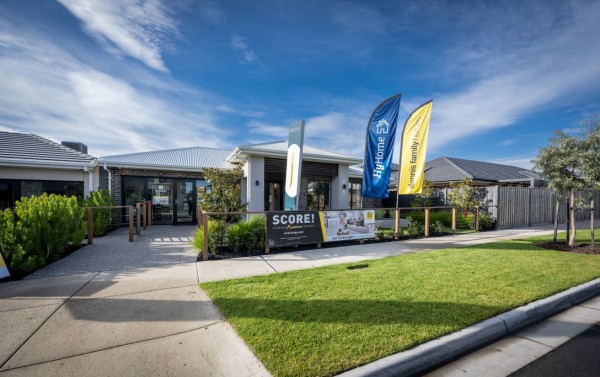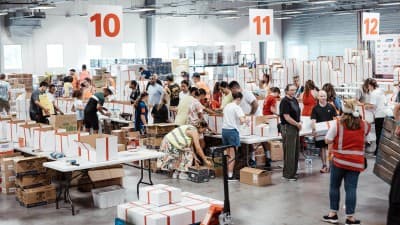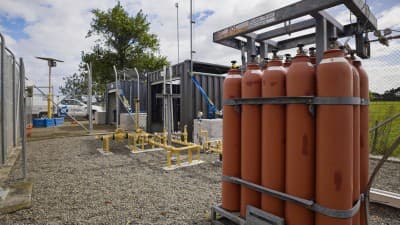This has been a banner year for renewable energy across the globe and in New Zealand – here are some of the big wins throughout the year in the green energy sector:
Auckland food scraps biogas project gets underway
New Zealand’s biggest city began to roll out its food scrap collection service, and by November 2023, had kept 9 million kilograms of food scraps out of landfill. Instead of going to waste, food scraps are transported to Ecogas’ Organics Processing Facility in Reporoa, to be turned into biogas and liquid fertiliser. The Auckland City Council is already seeing a reduction in the weight of refuse in kerbside rubbish bins and the project is on track to collect over 35,000 tonnes of food scraps annually.
New pipeline laid at First Renewables biogas facility
The first pipeline was laid at the First Renewables* biogas upgrade facility at Ecogas’ Organics Waste Facility in Reporoa. The new upgrade facility will take Ecogas’ biogas and upgrade to biomethane. This renewable gas will then be injected into the gas network – and once completed, is likely to provide enough biomethane to power an estimated 7,200 homes and avoid around 11,000 tonnes of CO2 each year.
*First Renewables is part of Clarus (formerly known as Firstgas Group).
Australian Government funding supports renewable energy feasibility study
The Australian Renewable Energy Agency (ARENA) announced a $291,785 grant to Logan City Council in Queensland to investigate renewable energy production from food and garden waste. The funding will support a $648,411 feasibility study into diverting food and green organics (FOGO) waste from households to produce biomethane at the Loganholme Wastewater Treatment Plant.
Delivery Plan launched for East Coast Hydrogen in the UK
Northern Gas Network along with Cadent Gas Limited and National Gas launched its East Coast Hydrogen plan in front of 150 guests at the House of Commons this year. The Plan demonstrates how the East Coast of the UK can meet the needs of key industrial users, who rely on gas, with 100% hydrogen in the future.
Belgian biogas plant officially opens
The EcoWerf biogas plant opened in Leuven, Belgium, in March. It produces 20,000 tons of green compost every year, while also producing 12,000mWh of renewable heat, enough to warm 500 households. The plant generates 11,000mWh of green electricity, powering 3,000 households, and saves 5,000 tons of CO2 emissions annually.
Chase Zero hits critical milestones

Sourced: Emirates Team New Zealand
Chase Zero is Team New Zealand’s hydrogen-fuelled foiling chase boat, and in May it hit some very encouraging milestones. It was clocked at 50 knots and showed it was able to travel further than a regular chase boat while saving the equivalent of 825 litres of petrol. More range, zero emissions, and it’s fast – Chase Zero is blazing a trail for clean energy on the water.
First offshore wind farm hardware deployed in Taranaki
A floating device that measures wind and sea conditions was deployed off the coast of Patea in June, signaling the first step in the development of an offshore wind farm. The huge buoy will provide readings to help gauge the feasibility of a $5 billion, one gigawatt wind farm. Offshore wind energy combined with hydrogen storage could be important to help decarbonise our energy network in the future.
Australia unveils its first hydrogen home

Sourced: Australian Gas Infrastructure Group
Australia’s first hydrogen home was unveiled in 2023, north of Melbourne. The HyHome features innovative hydrogen-powered hot water systems, heating systems, and cooktops made by Rinnai and Electrolux. The local AGIG gas network was recently upgraded to be ready to transport 100% green hydrogen to homes across Victoria, bringing hydrogen homes one step closer to everyday Australian households.
BlackRock to invest $2bn in green energy in New Zealand
US based investment firm BlackRock announced it would invest $2 billion in the New Zealand energy sector, to be spent on accelerating green hydrogen, solar and wind generation, as well as battery storage. BlackRock aims to help Aotearoa New Zealand become the first country in the world to decarbonise its electricity sector.
Kiwi green hydrogen aviation consortium announced
A new green hydrogen aviation group was launched in September, including Airbus, Air NZ, Christchurch Airport, Fortescue, Hiringa Energy and Fabrum. The New Zealand Hydrogen Aviation Consortium says by powering aircraft with hydrogen, as much as 900,000 tonnes of carbon emissions could be prevented every year by 2050.
Northern Ireland’s gas network gets biomethane injection
For the first time, Northern Ireland’s gas supply now includes biomethane. This renewable gas comes from food waste, which is anaerobically digested to produce biogas, before being upgraded to biomethane. That biomethane is an ideal substitute for natural gas and Evolve hopes it can provide most of Northern Ireland’s gas supply by 2030.
Hiringa Energy hits major project milestones
This year Hiringa Energy has been busy building green hydrogen production and refueling infrastructure across New Zealand and Australia. The refueling stations provide coverage for the key heavy freight routes and are powered by renewable electricity. They have installed an electrolyser, compressor and chiller units at Waitomo's Te Rapa refueling station site and will be commissioning the first of their four hydrogen refueling stations soon. They also lifted equipment onsite and in place at their South Auckland hydrogen refueling station. We can’t wait to see what they achieve in 2024.
Ecogas to provide Christchurch with organic waste solution
Ecogas was selected by Christchurch City Council to provide a bespoke, dual solution bioenergy facility to transform organic waste from kerbside collections, commercial and industrial organisations into renewable energy and biofertiliser. The Ōtautahi Christchurch Organics Processing Facility will feature biomass processing combined with anaerobic digestion and will be located in an industrial zoned site in South Hornby. The location has been carefully chosen to optimise transport, be close to collections agents, customers and critical infrastructure, while providing opportunities for the surrounding businesses to move to a renewable energy source.





